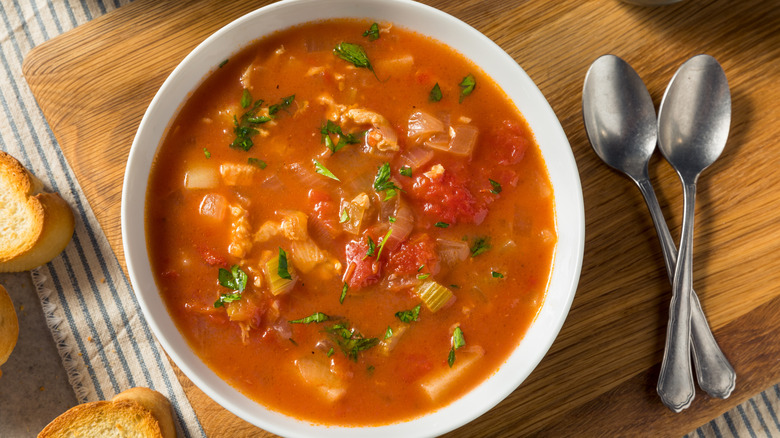Is It Really Illegal To Add Tomatoes To Clam Chowder In Maine?
Despite its regional differences, clam chowder is older than the United States itself. Even so, it would be impossible to talk about clam chowder at any length without mentioning the Manhattan versus New England debate: To tomato, or not to-mato? Some conspiracy-minded foodies maintain that it's actually illegal to add tomatoes to clam chowder in Maine, which is not true ... but almost was.
The year was 1939. State representative Cleveland Steeper of Rockland, Maine, wrote up a bill that would effectively criminalize the gastronomic act of adding tomatoes to clam chowder (gasp). The punishment for such an offense? Manual labor: Specifically having to "dig up a barrel of clams at high tide," according to the New England Historical Society, which "[a]s any clammer will tell you, [is] not only cruel and unusual punishment, but impossible." Clams prefer to reside in areas of low activity, and during high tide, they dig deep into their sea floor burrows for protection against the agitation. You won't find 'em in the high tidal zone.
Even though Steeper's bill never officially reached the courts, it certainly agitated waters of its own — agitation which could only be settled with a definitive, once-and-for-all clam chowder contest. The opposing chefs of the contest were chosen by Sleeper and by his rival Harry Tully, a Philadelphia restaurateur, President of the International Steward's and Caterer's Association, and apparent diehard tomato chowder fan.
Foodies belonging to the pro-tomato camp can chow down without fear of legal retribution
The "Distinguished Board of Clam Chowder Gourmets," as an article in the Nashua Telegraph from March 4, 1939, called them, included such esteemed judges as Maine Governor Lewis O. Barrow and Ruth Wakefield of Toll House Cookie immortality. The Board ultimately ruled in favor of creamy New England clam chowder. More accurately, it determined not that Manhattan chowder is bad, but that it is a totally different category of soup from its New England counterpart.
Per the Telegraph write-up: "Arthur L. Race of Boston, Vice President of the American Hotel Association and one of the chowder judges, observed that the Manhattan should be dubbed 'Tomato a la Clam,' and that the clam was merely an intruder in a good tomato soup." Cleveland Sleeper, after cautiously tasting the Manhattan, was quoted as saying, "Ugh ... This is vegetable soup. Not clam chowder.'" After the ruling was announced, Sleeper was also noted to triumphantly exclaim, "'If a clam could vote ... I would be elected president.'" (Sleeper did go on to get elected to the Maine state Senate in 1945.)
The ultimate impact of the contest wasn't the ratification of a law, but rather a perhaps more publicly-revered form of power: Shame on tomato chowder fans. Today, there is no existing law in Maine prohibiting the assembly or consumption of clam chowder with tomatoes. (Though on the other hand, either practice might attract a few disapproving glances from fellow diners.)

